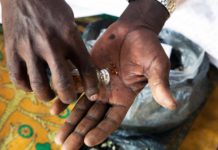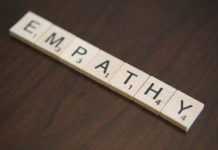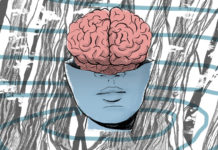Non-Pharmacological Interventions More Effective For Health in Schizophrenia
Review compares the effectiveness of pharmacological and non-pharmacological interventions for improving physical health outcomes in people diagnosed with schizophrenia.
Racial Discrimination a Clear Contributor to Youth Mental Health Disparities
Greater perceptions of discrimination during adolescence are linked to more depressive and internalizing symptoms.
Peer Providers of Mental Health Services Use Personal Narratives to Help
Interviews with peer providers indicate that they strategically use their personal illness and recovery story in order to assist others.
A Secret No Longer
My psychiatrist/therapist was able to give me a true understanding into what addiction and psychosis really are and how they can be treated with little or no medication. I still struggle, but I have been able to manage my symptoms with the help of ACT therapy, exercise, "forest bathing," storytelling, music and art. I am now able to feel a sense of peaceful fulfillment, and that is all anyone can really ask for.
Critical Psychologist On How Scientific Research Can Influence Public Policy
Critical participatory action research conducted on the higher education programs offered in prison leads to mobilized advocacy and shifts in public policy.
I Navigated the Mental Health System and Never Took Medications
I kept thinking, why was I the one to be labeled when my husband was doing all this unhealthy, violent stuff? I sought out doctors through health food stores and communities that didn’t believe in medications for a social and family problem. That way no controlling, pill-pushing medical doctor had authority over me.
United Nations Rep Brings Attention to Human Rights Violations in Psychiatry
Dr. Dainius Pūras argues that the status quo in mental health treatment is no longer acceptable and demands political action to promote human rights.
Better Outcomes Off Medication for Those Recovered from First-Episode Schizophrenia
A new study has found that of 10 people who were fully recovered from their first episode of schizophrenia (FES), those not taking antipsychotics did better in terms of cognitive, social, and role functioning—and reached full recovery more quickly.
Psychologists Advise How to Help and Minimize Harm Working With Migrants and Refugees
While well intentioned, providers and volunteers can do more harm than good at the border. The Global Psychosocial Network issues guidelines on how to work for the benefit of migrants and refugees.
What is Contributory Injustice in Psychiatry?
An article on contributory injustice describes the clinical and ethical imperative that clinicians listen to service users experiences.
Philosophers Challenge Psychiatry and its Search for Mechanisms of Disorder
Attempting to locate the mechanisms of psychiatric disorder is a step in the wrong direction and fails to challenge potentially unjust social practices.
How to Promote Community Inclusion in Mental Health Practice
Practitioners and public leaders identify methods and barriers for integrating those diagnosed with mental health issues into community life.
Researchers Call for Transparency About Limits of Psychiatric Knowledge
A new paper explores how the disputed nature of psychiatric knowledge influences public perceptions and debates within the field of mental health.
Pathways to Enhance Well-Being: Free Resource on Alternative Wellness Practices
This week we e-release a new free booklet, Pathways to Enhance Well-Being. Its creation began with my colleague Linda Lentini sharing with me some of the barriers she experienced as she moved towards bringing alternative approaches such as meditation and breath practices into state psychiatric institutions.
Early Intervention Can Change the Trajectory of Foster Care Children
Study highlights the importance of early interventions for institutionalized children.
Integrating Indigenous Healing Practices and Psychotherapy for Global Mental Health
As the Global Mental Health Movement attempts to address cross-cultural mental health disparities, a new article encourages integrating traditional healing practices with psychotherapy.
Research Progresses on Mindfulness Based Interventions for Adolescents
A new meta-analysis analyzes randomized control trials of Mindfulness-Based Interventions for adolescents.
Therapist Empathy Predicts Success in Psychotherapy
An updated meta-analysis reveals that therapist empathy is a predictor of better psychotherapy outcomes.
Study Identifies Benefits and Drawbacks of E-Mental Health
Study suggests that clinicians believe that rewards outweigh risks for using e-mental health resources in therapy.
Mental Health Service Users’ Perspectives on Family-Focused Recovery
Study explores a multifaceted approach to promote family-focused recovery practice.
New Study Explores Approaches to Discontinuing Antidepressants
Psychiatrist and psychologist outline pharmacological and psychotherapeutic strategies for discontinuing antidepressants.
Correcting Misconceptions of Trauma-informed Care with Survivor Perspectives
Trauma-informed approaches have the potential to promote recovery but must involve survivors and service-users to prevent the experience of retraumatization within psychiatric and mental health services.
The Impact of Mindfulness on Mental Health Stigma Resistance
A new study examines the association of mindfulness and stigma resistance among individuals with a psychiatric diagnosis.
Do Family Interventions for Psychosis Translate in China?
Researchers explore how family interventions for psychosis might be adapted to China’s emerging integrated mental health care landscape.
The Conflicts That Result From Globalizing Euro-American Psychology in India
Researchers examine the transformation of work, life, and identity in India as a result of Western corporate and psychological culture.

































